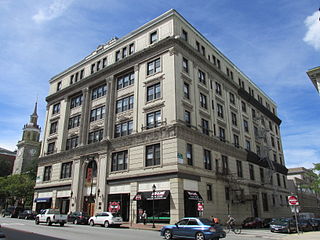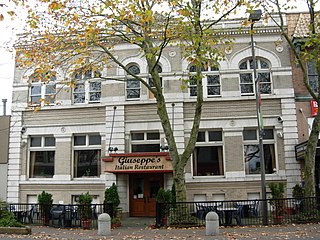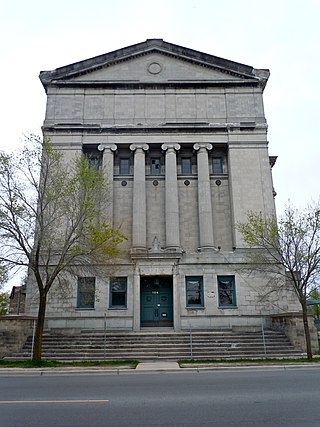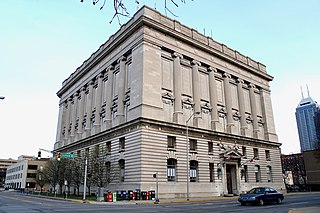
The George Washington Masonic National Memorial is a Masonic building and memorial located in Alexandria, Virginia, outside Washington, D.C. It is dedicated to the memory of George Washington, first president of the United States and charter Master of Alexandria Lodge No. 22. The tower is fashioned after the ancient Lighthouse of Ostia in Ostia Antica. The 333-foot (101 m) tall memorial sits atop Shooter's Hill at 101 Callahan Drive. Construction began in 1922, the building was dedicated in 1932, and the interior finally completed in 1970. In July 2015, it was designated a National Historic Landmark for its architecture, and as one of the largest-scale private memorials to honor Washington.

The House of the Temple is a Masonic temple in Washington, D.C., United States, that serves as the headquarters of the Scottish Rite of Freemasonry, Southern Jurisdiction, U.S.A.

The Detroit Masonic Temple is the world's largest Masonic Temple. Located in the Cass Corridor neighborhood of Detroit, Michigan, at 500 Temple Street, the building serves as a home to various masonic organizations including the York Rite Sovereign College of North America. The building contains a variety of public spaces including three theaters, three ballrooms and banquet halls, and a 160 by 100 feet clear-span drill hall.

The Scottish Rite Cathedral in Indianapolis, Indiana is a historic building designed by architect George F. Schreiber and located in downtown Indianapolis. It is owned by the Valley of Indianapolis Scottish Rite, an affiliated body of Freemasonry. It was built between 1927 and 1929 at the cost of $2.5 million. The cathedral is one of the largest Masonic buildings in the world and the largest Scottish Rite building anywhere. It has been described as one of the finest examples of Neo-Gothic architecture in the United States.

Frederick Heath was an American architect responsible for numerous projects in Tacoma, Washington. He worked out of his own office and as a senior partner at architectural firms. He was involved with Spaulding, Russell & Heath, and Heath & Gove. His work included designs for several historic and notable schools, churches, stadiums, and commercial properties.

Hilo Masonic Lodge Hall, also known as the Bishop Trust Building, is a historic structure in Hilo, Hawaii constructed between 1908 and 1910. It was designed to house commercial space on the ground floor and a meeting hall for a local Masonic lodge on the second floor. The Masons stayed until around 1985.

The Masonic Temple is a historic Masonic building in Philadelphia. Located at 1 North Broad Street, directly across from Philadelphia City Hall, it serves as the headquarters of the Grand Lodge of Pennsylvania, Free and Accepted Masons. The Temple features the Masonic Library and Museum of Pennsylvania, and receives thousands of visitors every year to view the ornate structure, which includes seven lodge rooms, where today a number of Philadelphia lodges and the Grand Lodge conduct their meetings.

Muncie's Masonic Temple is a historic fraternal lodge building located in Muncie, Indiana. The building is now only used by the Cornerstone Center for the Arts. The Muncie Masonic Temple is in the Gothic Revival style, and was designed and built during the height of the City Beautiful Movement.

The Masonic Temple is a historic commercial and fraternal society building at 415 Congress Street in downtown Portland, Maine. Built in 1911 to a design by local architect Frederick A. Tompson, it is one of the city's finest examples of Beaux Arts architecture, and houses some of the state's grandest interior spaces. It was listed on the National Register of Historic Places in 1982.

The Masonic Temple in Cadillac, Michigan is a commercial building built in 1899. It is the earliest surviving fraternal building designed by the prolific architect Sidney Osgood. It was listed on the National Register of Historic Places in 1994.

The B. P. O. E. Building, otherwise known as the Elks Club was originally built for the Bellingham chapter of the Benevolent and Protective Order of Elks in 1912, during the city's second major building boom. It is located within the vicinity of the old Federal Building on Cornwall Avenue, historically known as Dock Street. The Elks no longer occupy the building and it is now home to an Italian restaurant. It was listed on the National Register of Historic Places on March 26, 1992.

The Masonic Temple in Aurora, Illinois was a historical building where Freemasons held meetings. Opened in 1924, it was added to the National Register of Historic Places in 1982. On October 7, 2019 it was gutted by fire, leading to its subsequent demolition.

The Allentown Masonic Temple is an historic Masonic building located in the city of Allentown in Lehigh County, Pennsylvania.

The current Indianapolis Masonic Temple, also known as Indiana Freemasons Hall, is a historic Masonic Temple located at Indianapolis, Indiana. Construction was begun in 1908, and the building was dedicated in May 1909. It is an eight-story, Classical Revival style cubic form building faced in Indiana limestone. The building features rows of engaged Ionic order columns. It was jointly financed by the Indianapolis Masonic Temple Association and the Grand Lodge of Free and Accepted Masons of Indiana, and was designed by the distinguished Indianapolis architectural firm of Rubush and Hunter.

The Auburn Masonic Temple is located at 10 Auburn Way South in Auburn, Washington. The building was listed on the National Register of Historic Places in 2015 and is significant for various reasons. The building is "an unusually sophisticated, urban version of fraternal architecture for a town of less than 3,500. It remains today the only fraternal hall in the city still in its original use."
Masonic Hall in New York City is the headquarters of the Grand Lodge of Free and Accepted Masons of the State of New York. It has been located at 23rd Street and 6th Avenue in the Flatiron district since 1875. The current building, completed in two phases, dates from 1909 and 1913.

The Asheville Masonic Temple is a Masonic Temple located in Asheville, North Carolina. Designed by British American architect and Freemason Richard Sharp Smith, the building was opened in April 1915. It is listed in the United States National Register of Historic Places as a contributing building in the Downtown Asheville Historic District.

The Barnes Building, originally known as the Odd Fellows' Block, the Masonic Temple from 1909 to 1915, and later Ingram Hall, is a historic fraternal and office building located at 2320-2322 1st Avenue in the Belltown neighborhood of Seattle, Washington. Designed in early 1889 and constructed in late 1890 by Seattle Lodge No. 7 of the International Order of Odd Fellows and designed for use by all of the city's Odd Fellow lodges, it is the earliest known surviving work of Seattle architect William E. Boone and George Meeker and remains in an almost perfect state of preservation. The Barnes building has played an important role in the Belltown Community and Seattle's dance community. It was used by the Odd Fellows for 17 years before their departure to a newer, bigger hall in 1909 and was home to a variety of fraternal & secret societies throughout the early 20th century, with the Free and Accepted Masons being the primary tenant until their own Hall was built in 1915. The ground floor has been a host to a variety of tenants since 1890 ranging from furniture sales to dry goods to farm implement sales and sleeping bag manufacturing, most recently being home to several bars. It was added to the National Register of Historic Places as The Barnes Building on February 24, 1975.

Hickory Corners Masonic Temple, also known as Hickory Lodge No. 345 is a Masonic Temple located at 4558 West Hickory Road in Hickory Corners, Michigan. The building was listed on the National Register of Historic Places in 2021.

The Deer Lodge Central Business Historic District, in Deer Lodge, Montana, in Powell County, Montana, is a historic district which was listed on the National Register of Historic Places in 2008.




















